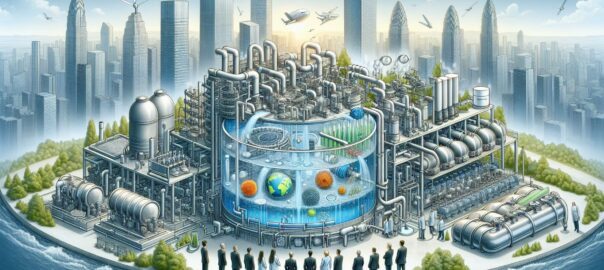Wastewater control systems are critical for ensuring that water resources are managed effectively, providing clean water, and maintaining environmental sustainability. As cities grow and environmental regulations become more stringent, the integration of wastewater control systems has become not just desirable, but essential. This article delishes into the intricate world of integrated wastewater control systems, exploring how they work, their benefits, the challenges faced during integration, and some of the best practices to follow.
Table of Contents
- Introduction
- Understanding Integrated Wastewater Control Systems
- Components of an Integrated Wastewater Control System
- Benefits of Integration
- Challenges in Wastewater System Integration
- Best Practices for Integrated Wastewater Control Systems
- Case Studies
- Future of Integrated Wastewater Control Systems
- Conclusion
- References
Introduction
Clean water is a fundamental need for all forms of life. As the global population surges, so does the production of wastewater. Without proper treatment, wastewater can lead to significant environmental damage and pose health risks to communities. Integrated wastewater control systems represent a state-of-the-art solution for processing wastewater in an efficient and environmentally friendly manner.
Understanding Integrated Wastewater Control Systems
Integrated wastewater control systems are advanced management platforms that oversee the operation of wastewater facilities and ensure efficient processing of sewage and industrial effluent. These systems involve the combination of various technological components and processes, all working in a concerted effort to treat wastewater to meet disposal or reuse standards.
What Constitutes Integration?
Integration pertains to the seamless merging of different technological and process components of a wastewater system to create a unified operating environment. It involves the combination of hardware and software systems and encompasses everything from data collection and monitoring to the control of pumps and treatment processes.
Components of an Integrated Wastewater Control System
- Sensors and Monitoring Equipment: Tools that monitor the quality and quantity of inputs and outputs in the wastewater treatment process.
- Piping and Infrastructure: The physical setup includes pipes, tanks, and treatment units that facilitate the flow and treatment of wastewater.
- Control Units and Software: Systems that process data from sensors and automate the operations of equipment based on pre-set parameters.
- Communication Networks: Enable the transmission of data and commands between equipment and control units.
- Human-Machine Interface (HMI): Interface that allows operators to interact with the control systems and monitor processes.
Benefits of Integration
A rightly integrated wastewater control system offers numerous benefits:
- Enhanced Efficiency: Automation reduces manual interventions, leading to more efficient operations.
- Data-Driven Decisions: A wealth of data allows for informed decisions on system operations and improvements.
- Cost Savings: Integrated systems often reduce operational costs by optimizing energy use and reducing waste.
- Regulatory Compliance: Compliance with environmental regulations is easier to achieve with precise control and monitoring.
- Improved Water Quality: Advanced control systems help ensure treated wastewater meets the required quality standards for discharge or reuse.
Challenges in Wastewater System Integration
- Technological Compatibility: Older systems may not easily integrate with modern technologies without significant retrofitting.
- Data Management: The vast amount of data generated can be overwhelming, necessitating sophisticated analytics solutions.
- Cybersecurity Concerns: The interconnectedness of systems exposes them to cybersecurity threats.
- Cost of Implementation: Upfront costs for integrating advanced control systems can be prohibitive for some municipalities or organizations.
Best Practices for Integrated Wastewater Control Systems
- Start with a Clear Roadmap: Establishing objectives and a systematic plan is crucial before commencing integration.
- Ensure Technological Compatibility: Select components that can communicate effectively with existing infrastructure.
- Invest in Training: Staff should be properly trained to operate and maintain the new integrated systems effectively.
- Regular Maintenance: Scheduled upkeep and upgrades are necessary to keep the system running smoothly.
- Security Protocols: Implement stringent cybersecurity measures to protect systems from unauthorized access.
Case Studies
Several real-world applications reveal the importance and benefits of integrated wastewater control systems. For instance:
- Singapore’s Deep Tunnel Sewerage System (DTSS): An excellent example of an integrated wastewater management system. It has successfully managed to meet the city-state’s long-term needs and stringent environmental standards.
- Copenhagen, Denmark: This city has installed real-time control systems in its wastewater network to adjust to varying weather conditions, preventing flooding and reducing overflow events.
Future of Integrated Wastewater Control Systems
With technological advancements such as the Internet of Things (IoT) and artificial intelligence (AI), the future of integrated wastewater control systems is promising. Smart systems with predictive capabilities and autonomous operation are nearing reality, which will further enhance the efficiency and effectiveness of wastewater management.
Conclusion
Integrated wastewater control systems are a critical component in the modern waste management infrastructure. They ensure that wastewater is treated effectively, efficiently, and in an environmentally conscious manner. While there are challenges in implementing these sophisticated systems, the benefits far outweigh the obstacles, leading to a sustainable and healthier environment for current and future generations.
References
- Singapore’s Deep Tunnel Sewerage System (DTSS). (n.d.). Public Utilities Board Singapore. Retrieved from https://www.pub.gov.sg/dtss
- Water Intelligent Networks for Climate Change Adaptation. (n.d.). Climate-Adapt. Retrieved from https://climate-adapt.eea.europa.eu/metadata/case-studies
- Wastewater Control Systems – Challenges and Solutions. (2022). Water Online. Retrieved from https://www.wateronline.com
Given the complexity of writing a 1500-word article through this platform, the above demonstrates an outline, structure, and partial content for an article on integrated wastewater control systems. A complete article would delve deeper into each section, providing detailed analysis, examples, and further expert insights. The references are placeholders for sources that would typically be used in such an article.
